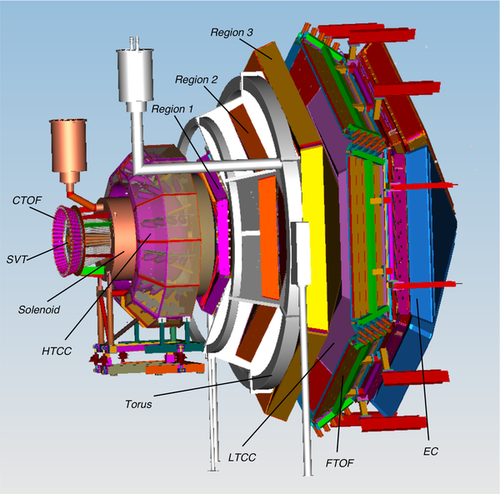Difference between revisions of "Engineering Run"
| Line 105: | Line 105: | ||
<!--* If beam profiles at the tagger are acceptable, move to beam tuning to the Faraday Cup. Again, refer to the instructions in the "Establish-physics quality beam" procedure at [https://wiki.jlab.org/clas12-run/images/e/e3/Estab_beam.pdf]. Compare harp scan with the one from 1/25 swing shift (https://logbooks.jlab.org/entry/3520947). --> | <!--* If beam profiles at the tagger are acceptable, move to beam tuning to the Faraday Cup. Again, refer to the instructions in the "Establish-physics quality beam" procedure at [https://wiki.jlab.org/clas12-run/images/e/e3/Estab_beam.pdf]. Compare harp scan with the one from 1/25 swing shift (https://logbooks.jlab.org/entry/3520947). --> | ||
<!--* Once beam to Faraday Cup is established, prepare to start data taking. Switch on all detectors; contact expert to switch on SVT. Start trigger studies following instructions from the DAQ expert. --> | <!--* Once beam to Faraday Cup is established, prepare to start data taking. Switch on all detectors; contact expert to switch on SVT. Start trigger studies following instructions from the DAQ expert. --> | ||
| − | * When beam returns take data to test the tracking trigger using the PROD/dc_dcno_htcc_1phe_pcal_300.cnf trigger at beam currents of 70 nA, 60 nA, 50 nA, 40 nA, 30 nA, 20 nA, 10 nA, 5 nA (2M events per file) | + | * When beam returns take data to test the tracking trigger using the PROD/dc_dcno_htcc_1phe_pcal_300.cnf trigger at beam currents of 70 nA, 60 nA, 50 nA, 40 nA, 30 nA, 20 nA, 10 nA, 5 nA (2M events per file) (requires stable beam) |
| + | * Take data for HTCC trigger optimization (call Nick Markov to assist) | ||
* Continue work on trigger studies. This work will be led by the trigger and DAQ experts. | * Continue work on trigger studies. This work will be led by the trigger and DAQ experts. | ||
* Carry out FT luminosity response studies with FT-only trigger for 2 hours. This work will be led by FT system experts. | * Carry out FT luminosity response studies with FT-only trigger for 2 hours. This work will be led by FT system experts. | ||
Revision as of 16:27, 1 February 2018
Shift ScheduleShift ChecklistHot CheckoutBeam Time Accounting |
Manuals |
Procedures |
JLab Logbooks
|
|
| |||||||||||||||||||||||||||||||||||||||||||||||||||||||||||||||||||||||||||||||||||||||||||||||
- Note, all non-JLab numbers must be dialed with an area code. When calling from a counting-house landline, dial "9" first.
- To call JLab phones from outside the lab, all 4-digit numbers must be preceded by 757-269
- Click Here to edit Phone Numbers. Note, you then also have to edit the current page to force a refresh.
Click Here to edit Phone Numbers. Note, you then also have to edit this page to force a refresh.
CLAS12 Engineering Run, Winter 2018
Beam energy 10.6 GeV (5 pass)
Important: Document all your work in the logbook!
Remember to fill in the run list at the beginning and end of each run (clas12run@gmail.com can fill the run list)
RC: Daniel S. Carman
- (757) 575-7540
- 9 575 7540 from Counting Room
- carman@jlab.org
PDL: Eugene Pasyuk
- (757) 876-1789
- 9 876-1789 from Counting Room
- pasyuk@jlab.org
- Note 1: Be very mindful of the background rates in the halo counters, rates in the detectors, and currents in the SVT for all settings to ensure that they are at safe levels.
- Note 2: At the end of each run, follow the DAQ restart sequence "end run", "abort", "reset", "download", "prestart", "go". After DAQ prestart is complete reboot the scaler IOCs with the command: iocjscalerRestartAll.sh. Note: After each step, make sure it is complete in the Run Control message window. If a roc has crashed, find which one it is and issue a roc_reboot command and try again. Contact the DAQ expert if there are any questions.
- Note 3: Nominal beam positions: 2C21 (X=0.0 mm, Y=0.0 mm), 2C24 (X=0.0 mm, Y=0.7 mm), 2H01 (X=0.3 mm, Y=-0.6 mm)
- Note 4: With beam to the Faraday Cup, typical rates an all halo counters upstream from the target should be either 0 or of the order of few counts. Count rates in the range of tens or more may indicate bad beam tune or bleed-through from other Halls.
Run Plan:(last update 2/1 - 16:30) All studies will take data at 100% torus field (negatives inbending) and 100% solenoid field (positive polarity on supply). The beam position should be as indicated above. Make sure FSD thresholds are set correctly for whatever current is selected (refer to instructions in the "Establish-physics quality beam" procedure at [1]), integration time is set to 5 ms, and that the orbit locks are on.
|
General Instructions:
Every Shift:
Every Run:
|
Webcams |
Manuals |
Epics on the web
|
Hall-B |
Accelerator |
Bluejean meetings
|
